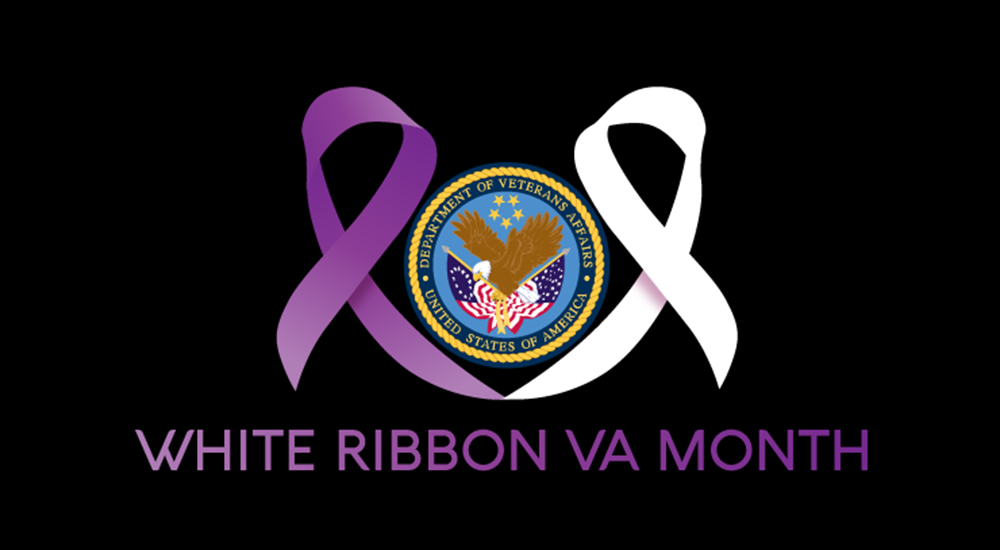If this is not the right time to eliminate sexual harassment, sexual assault and domestic violence in VA health care settings, then when? If we are not the right group to stop violence against others, then who?
The first National Domestic Violence Awareness Month was designated in October 1987. The following 33 Octobers have brought attention to the victims, survivors and witnesses of violence. This month serves to focus our attention on the deep impact of domestic violence and abuse on those individuals. It also gives us the opportunity to join with them to say it is time to rise against violence.
You can help take a stand today. Wear a purple ribbon to honor those who have experienced domestic violence. Add a white ribbon and take White Ribbon VA Pledge to answer the call to Stand Up to Stop Harassment Now. Recognize this month by wearing both a purple and white ribbon. By taking action to eliminate violence, you give a voice to those whose experience and pain may otherwise be silenced.
A quick look at the data provides a shocking reality. In terms of domestic violence, an average of 20 people per minute are abused by an intimate partner. Health care workers are as much as five times more likely to experience an injury due to workplace violence as those in other professions.
Numbers represent people who have suffered
These data points are important. They demonstrate the impact of violence in terms of numbers. But those numbers lose meaning if the impact does not motivate action. The challenge is how to use this month as an opportunity to reflect on what we can do to address violence in different forms. The importance of this topic is that these numbers are not just numbers: they also represent people who have suffered and are suffering. They also represent those who we may be able to prevent from suffering in the future.
The odds are great that you may know someone who has experienced or is experiencing violence. It might be you. If that is the case, we stand with you and we must all stand up against violence. We are drawing attention to this topic and pledging to do something to make a difference.
We begin to address the problem by treating others with dignity and respect, by bringing attention to violent and harassing comments and behaviors, by Standing Up to Stop Harassment Now, by moving from a bystander to being an upstander. An upstander is someone who advocates for an individual who is being attacked, harassed or harmed.
We do this by combining our competency as health care workers with a heart that clearly states to all who come into a VA facility that we represent a place of healing – not a place for harming.
Silence can be deafening
We do not spend enough time talking about mean, bullying, disrespectful comments or harmful behavior experienced by patients, providers, trainees and other staff. That silence can be deafening when you have experienced harassment or assault. This month provides a focused time for us to double down on our identity as providing care for our nation’s Veterans with empathy, compassion and competency.
How do we take our competencies and apply them to this problem? The first step starts with recognizing the problem and then making a commitment to act. Make White Ribbon VA Month and Domestic Violence Awareness Month about increasing awareness in others. And use it to understand the actions you can take, and take a stand against violence.
Will you help break the silence on violence? Will you dedicate yourself to work individually and collectively to ensure those who experience harassment or assault can find an advocate to stand with them? Will you reflect and mobilize on how to discuss this topic more openly with patients, visitors, trainees and colleagues?
This is the time to make a commitment. Will you stand with me and take White Ribbon VA Pledge?
Please see the reports from the Centers for Disease Control and Prevention and the National Coalition Against Domestic Violence (NCADV) for additional information about domestic violence, as well as the US Department of Labor and The US Bureau of Labor Statistics for data about violence in health care settings.
Jeffrey Bates, Ph.D., is the associate director of Associated Health Education, Office of Academic Affiliations.
Topics in this story
More Stories
The Medical Foster Home program offers Veterans an alternative to nursing homes.
Watch the Under Secretary for Health and a panel of experts discuss VA Health Connect tele-emergency care.
The 2024 National Veteran Suicide Prevention Annual Report provides the foundation for VA’s suicide prevention programs and initiatives.






